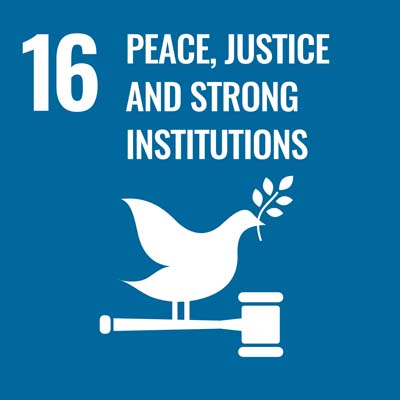The sixteenth Sustainable Development Goal is to promote peaceful and inclusive societies for sustainable development, provide access to justice for all and build effective, accountable and inclusive institutions at all levels.
2023 progress report
Our organisation
Part of being a strong institution involves ensuring that our governance structures are robust, fair and transparent. In 2022/23, we published Making Change Happen – a new Equity, Diversity and Inclusion Strategy (EDI) and action plan, supported by a range of policies and procedures and overseen by a newly formed Executive EDI & Wellbeing Committee. See the University Executive page for its terms of reference. An online Report & Support tool for both students and staff to report inappropriate behaviours was also launched in 2023.
Our 2022/23 financial statement can be found on our governance and policies page and our annual EDI report can be found on our diversity page.
Working with stakeholders
Outline planning was approved to enable Marshall to begin detailed design work for the first phase of its development at Cranfield. This follows active engagement throughout the consultation process by residents and representatives of local communities, and close working with Central Bedfordshire Council.
Our CEO and Vice-Chancellor, Karen Holford, was appointed chair of the Midlands Innovation Board, which had an active year during 2023.
Working with governments
Cranfield University and the National Crime Agency, which leads the UK’s fight to cut serious and organised crime, signed a Memorandum of Understanding in 2023 to share expertise and collaborate on projects of mutual interest
In June 2023, the Department for Science, Innovation and Technologies (DSIT) appointed Cranfield University, in partnership with Collingwood Environmental Planning (now Eunomia), as a supplier to the ‘Futures Framework’, which is supporting HMG Departments and Agencies to establish Futures capabilities and to conduct Futures work. The prospectus can be downloaded from the project web page.
Education
Our Digital Forensics MSc course was awarded Academic Partner status with the leading industry body, the Institute of Cyber Digital Investigation Professionals, which is run through CIISec (the Chartered Institute of Information Security). The award recognises our cyber digital investigation expertise and will offer students an insight into the work of Law Enforcement.
The Chartered Society of Forensic Sciences (CSFS) and Cranfield Forensic Institute (CFI) are collaborating to recognise forensic specialists within the UK Armed Forces who deal with incidents involving hazardous materials.
Cranfield staff have contributed to discussion on subjects relevant to SDG 16, such as conflicts in Ukraine and Afghanistan.
Research
The 2022/23 Defence and Security yearbook can be downloaded from our website.
Leica Geosystems sponsored the Cranfield Forensic Institute to establish a specialist Crime Scene House on the University campus to serve as a controlled setting for practising and enhancing investigation, evidence collection, and forensic analysis skills.
Cranfield entered into an Implementing Partner Agreement with the United Nations Office on Drugs and Crime to enable its academics to use AI to interpret data from satellites to track where the crops, used for drug production, are grown in Afghanistan.
Dr Jane Hodgkinson and Dr Rachael Hazael (two female engineers at Cranfield University in the Top 100 Women in Engineering) were highly commended as finalists of the prestigious 2023 Top 50 Women in Engineering (WE50) awards. Focusing on safety and security, the awards highlighted the work that female engineers around the world were doing to support lives and livelihoods every day.
2022 progress report
Our organisation
Part of being a strong institution involves ensuring that our governance structures are robust and transparent. In 2021/22, we reviewed the committees reporting into the Executive, rationalised them and included terms of reference on our website. In line with our new Corporate Plan and associated strategies, we have re-named Human Resources to become People and Culture and strengthened our focus on equality, diversity and inclusion.
Our 2021/22 financial statement can be found on our governance and policies page.
Working with stakeholders
We introduced a new policy to support our engagement with local stakeholders (People tab). Extensive consultations on proposals to relocate Marshall from Cambridge to Cranfield were held throughout 2022 to provide a full response to key questions raised by community members.
We have established a strategic partnership with experienced digital forensic practitioners CCL Solutions Group, as we continue to develop our new, state-of-the-art forensic science education and research centre.
Working with governments
We continued to work with governments, for example, on renewable energy provision in Peterborough, with the Thai government on the Bio-Circular-Green Economic Model, and with organisations in the US to look at water infrastructure resilience.
Education
Cranfield staff have contributed to education and wider discussion on subjects relevant to SDG 16, such conflicts in Ukraine and Afghanistan, and ancient migration.
Research
The 2021/22 Defence and Security yearbook can be downloaded from our website.
2021 progress report
Our evidence for this goal in The Times Higher Education Impact Rankings includes reporting our policies on academic freedom (including information in our statutes about our Senate and Council and Student Association representation).
We engage locally through the University’s Regional Engagement Team that meets weekly with reps from Central Bedfordshire Council and bi-monthly with Bedford Borough Council.
We have joined forces with Milton Keynes Council and business partners to develop and inform decision making for a new university, MK:U.
Cranfield is co-leading a new international project to examine the role of culture and archives in enhancing possibilities for peace and preventing conflict in communities around the world. Imagining Futures through Un/Archived Pasts is a four-year, £2 million project funded by the Arts and Humanities Research Council and will establish an interdisciplinary network to connect creators and institutions in Africa, the Middle East, North America and Europe.
Our academics participate as advisers to local, regional and national government, for example:
- Pirienergy project – working with Peterborough City Council and other partners, the project aimed to deliver low-cost and low carbon emission energy for the Peterborough community which could be transferred to other cities.
- Soil policy for Wales – Dr Jacqueline Hannam worked with the Welsh Government to develop the first Soil Policy Statement for Wales. The report has now been published.
Our leadership of the Academic Resilience and Security Community (RiSC) is an example of providing a neutral platform for stakeholders to discuss challenging subjects. RiSC is a network of universities formed to promote academic engagement in solving challenges in national security and resilience. It is recognised by the Home Office and other Government departments as a portal to academia.
Courses/modules relating to the goal
The following courses either address sustainability entirely or contain modules that are focused on sustainability-related topics.
Counterterrorism MSc
Counterterrorism Risk Management and Resilience MSc
Digital Forensics MSc
Executive MBA
Forensic Archaeology and Anthropology MSc
Forensic Ballistics MSc
Forensic Explosive and Explosion Investigation MSc
Forensic Investigation MSc
Advanced GIS and Remote Sensing MSc
Management and Corporate Sustainability MSc
Management and Human Resource Management MSc
Management and Leadership MSc
Management MSc
MBA
Sustainability MSc

